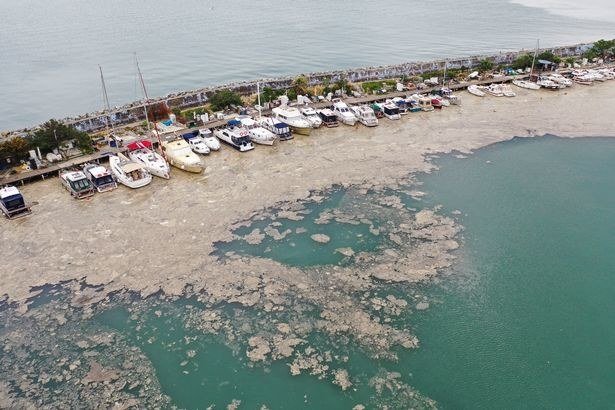LONDON: A mucus-like substance known as “sea snot” is blanketing the shores near Istanbul after covering huge areas of the Marmara Sea, threatening sea life and prompting warnings that it could bring deadly diseases in its wake.
The problem is particularly acute in the Gulf of Izmit, southeast of the city, with fishermen unable to work because they cannot operate motors or nets in the sludge.
The brown, viscous substance is a mixture of fat, carbohydrates and protein emitted by tiny phytoplankton, which multiply rapidly when chemical pollutants and sewage are pumped into the water.
It kills sea life by blocking out vital sunlight and, as it sinks, coats the sea floor and accelerates the decomposition of creatures.
The phytoplankton responsible grow out of control when nutrients such as nitrogen and phosphorus are widely available in seawater. Rising sea temperatures add to the problem.
Divers have reported large numbers of fish dying, and say that marine life has been forced to seek refuge in small holes or other forms of aquatic shelter.
Experts have also warned that the substance provides fertile ground for dangerous bacteria, including cholera.
Istanbul has suffered from frequent cholera epidemics in its history. The most recent, in 1970, left 50 people dead and thousands more infected.
Cholera usually strikes countries with poor sanitation and water hygiene infrastructure. Victims commonly experience vomiting, diarrhea and muscle fatigue.
Turkish Environment Minister Murat Kurum said that a 300-strong team had been sent to tackle the “sea snot” problem.
However, the rapidly multiplying plankton quickly recovered from attempts to sweep it away.
Muharrem Balci, a marine biology expert at Istanbul University, said: “A short-term solution is very difficult, I would say impossible.
“The first thing to do is to reduce run-off and associated pollution, then international cooperation is needed for the improvement and protection of marine life in the Mediterranean and Black Sea ecosystems, which are connected to the Marmara Sea through the Turkish straits.”






















